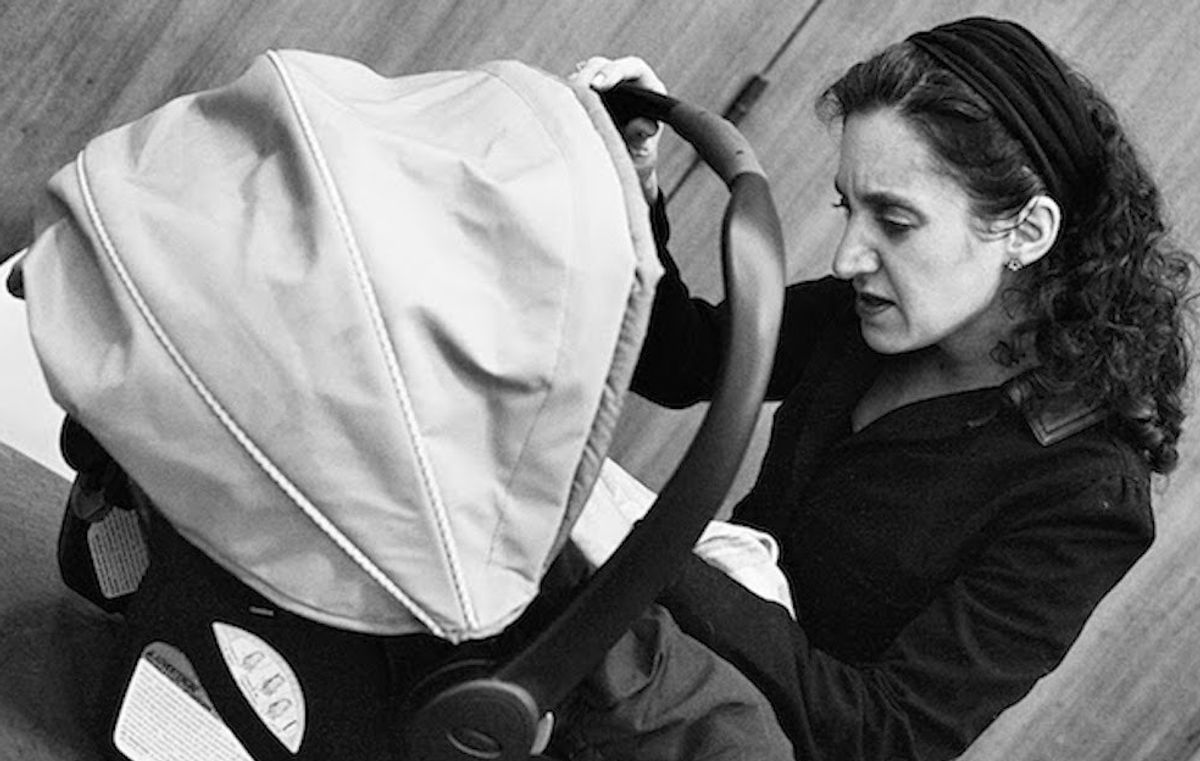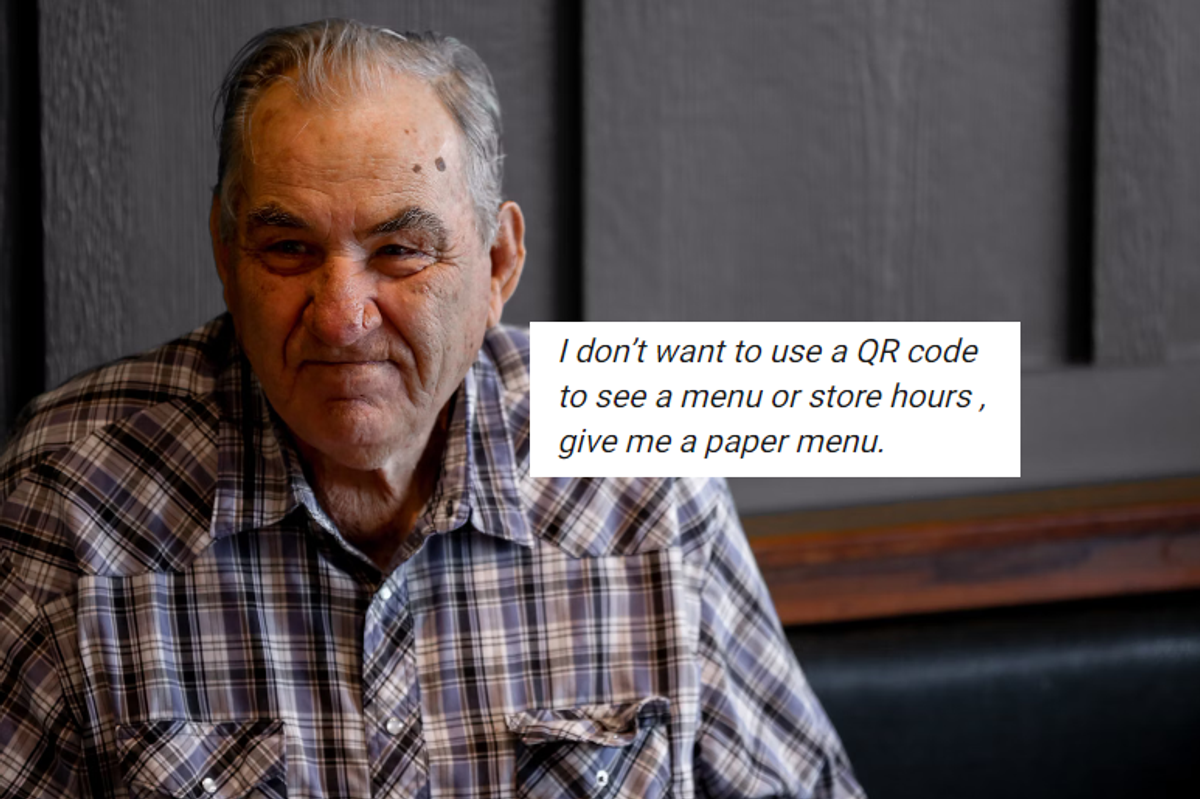Meet a mom who takes care of people's babies while they make huge parenting decisions.
This is what it's like to be an 'interim parent.'

Jillian, “...my heart skips a beat."
I'm trying desperately to be respectful of the person speaking to me, but my husband keeps texting me.
First he sends me a selfie of him with Rafi*, then it's an account of who stopped him on his way into the NICU.
Then, he suggests I take a selfie with Jillian* so he can post them side-by-side on Facebook and boast that we finally have two babies.
People will ask if they're twins, I'm sure. But they're not twins. In fact, the babies aren't even ours.

James' dream come true: Two babies! Rafi in the NICU with Tatte, Jillian at home with Eema.
Photo by Ann Lapin, used with permission.
I take care of these babies because I'm what's known as an "interim parent."

Over the past four years, my family has cared for 22 newborns.
Photo by Ann Lapin, used with permission.
The program I'm part of is rare; there are very few like it in the United States.
While the babies are in my care, the birth parents retain their legal rights as parents and are encouraged to visit their babies (if that's something they would like).

My three kids with our baby before he meets his forever mommy.
Photo by Ann Lapin, used with permission.
If they weren't in the care of interim moms like me, these tiny babies might wait in the hospital a few extra days while their adoptions are finalized—or they might enter the foster care system.
In New York and most states, biological parents have 30 days after adoption proceedings begin to change their minds about their placement plan.
I became an interim parent when a local mom posted about it on our neighborhood Yahoo! group.
"That! THAT I can do!" I thought, as I looked at the computer screen.
I was thrilled. I felt incapable of doing other types of volunteer work, but I felt like I had finally found a community service that I could perform. So, my husband and I applied. And after months of doctor appointments, background checks, interviews, and letters of reference from close friends, we were accepted.

We left the adoption agency with an empty stroller — but it didn't stay that way for long!
Photo by Stacey Natal/ Total City Girl, used with permission.
The hope with the interim boarding care program is that biological parents have time to gain clarity about their decisions without pressure.
It also helps adoptive parents feel secure in their status as parents.
The children don't usually get the chance to be present when one of our babies goes home, so this was a special day. Roughly 30% of the babies I've cared for have returned to their biological parents after their stay with me, and the rest have been adopted. Many of the birth mothers I've known have pursued open adoptions, selecting and meeting their child's forever families.People often ask me what the experience of interim parenting is like, but there's no rule: Each case is different.
Babies stay with us, on average, for a few weeks. But one baby stayed with us with five days, another for nine and a half weeks.
Whatever the scenario, my family and I are available to care for these babies until they go home ... wherever "home" may be.

This work can be emotionally challenging, too.
Photo by Stacey Natal/Total City Girl used with permission.
This work can be emotionally challenging, too. Some biological parents do not interact with us at all while they're making big decisions, and some end up being very involved. Some text regularly, requesting photos and updates on the baby while the baby is in our care. Sometimes they schedule weekly visits with the babies. One birth mom became such a constant in our life that my son asked if we could bake her cookies.
I am often blown away by the biological parents' gratitude.
Melody* was one of the most beautiful babies I'd ever cared for, and I met her parents a couple of times. When they came to take her home, it was as though she was the only one in the room. When they thanked me for taking care of her, my lip started to quiver.
I had also never met Jibraan's dad, either, when I placed him in his arms the day they went home together. "From the bottom of my heart ... I can't tell you what you've done for me," he said. I remember that he towered over me, the size of a linebacker, clenching his jaw to keep the tears from spilling down his cheeks.

Big smiles and on the phone.
Photo by Stacey Natal/Total City Girl, used with permission.
When I wave goodbye to the social workers at the agency after introducing each baby to their forever family, I always wonder how long it will be before I get to hold another baby.
I don't get attached to each baby, per se. But I get attached to having a baby, to taking care of a baby. I resent my empty arms, and I feel like I've lost my purpose. So each time I see the adoption agency's phone number pop up on caller ID, my heart skips a beat.
When the voice on the other end says, "Hi, Ann ... are you ready to take another baby?" my first thought is, "Baby! I'm getting a BABY!" That excitement lasts for at least 48 hours.
But even as the adrenaline calms down and the sleepless nights begin to take their toll, the experience of caring for each baby proves to be more than enough motivation for me to keep going.
The emotions that swell when my babies go home with any parent—their adoptive parents or their birth parents—are not just because of the emptiness I feel in my arms or even because of the happiness I have for my babies and their families.
The emotions I feel are because of the fullness in my heart and the gratitude I have for being a part of each of these babies' stories, even if it's just for a moment.
This article was written by Ann Lapin and originally appeared nine years ago.
- Women were dying from childbirth at hospitals. This 19th-century ... ›
- Mama cat rushed her kitten with an eye infection into a hospital and ... ›
- NICU doctor shares how much she loves 'hyping up' her baby patients - Upworthy ›
- US mom living in Sweden scolded for swaddling baby at hospital - Upworthy ›
- Dad's viral reaction to finding out babies don't have kneecaps has people in hysterics - Upworthy ›
- Mom admits parenting can be 'deeply unsatisfying' - Upworthy ›
- Mom recalls when older man complimented her 6-year-old's appearance - Upworthy ›






 A woman is getting angry at her coworker.via
A woman is getting angry at her coworker.via  A man with tape over his mouth.via
A man with tape over his mouth.via  A husband is angry with his wife. via
A husband is angry with his wife. via 
 Some Boomer grandparents are being called out for "gramnesia".
Some Boomer grandparents are being called out for "gramnesia".

 A woman gets a tattoo.
A woman gets a tattoo. Boy playing on the computer.
Boy playing on the computer.
 Grumpy boomers aren't wrong about everything. Photo by
Grumpy boomers aren't wrong about everything. Photo by  Even the young people can't stand QR codes. Photo by
Even the young people can't stand QR codes. Photo by  Everything, even fast food, has gotten out of control expensive. Photo by
Everything, even fast food, has gotten out of control expensive. Photo by